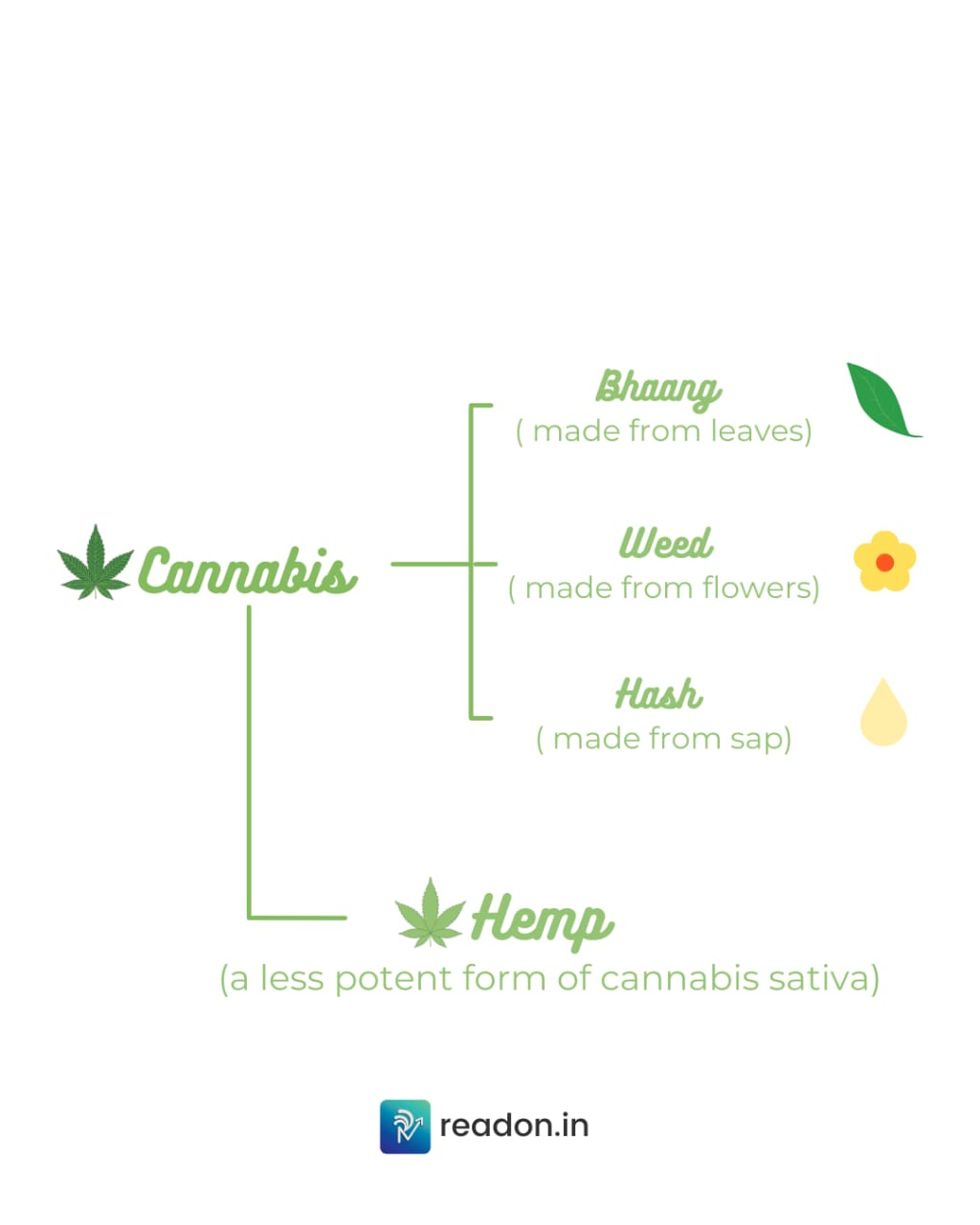☘ What if India Legalised Weed?
India loves weed. So, we're taking a look at how legalising weed could impact the country.
For most Indians, Holi is the festival of colours, of celebration, and joy.
And for many, this joy and celebratory spirit comes from intoxication.
Yes, we're talking about bhaang.
Bhaang and Holi go hand in hand. Just look at all the Holi songs that mention bhaang. Every family has a funny bhaang story to tell.
Many even consider it as a "prasaad" (blessing) of Lord Shiva.
But have you wondered why marijuana or weed is illegal when bhaang is perfectly acceptable?
Now before we dive deeper into this topic, a disclaimer: we do not support or promote the consumption of weed, bhaang or any other narcotics.
But we were just curious about what would happen if India legalised marijuana or weed.
🌱 Bhaang v/s Weed
Now, many of you may be wondering what's the difference between bhaang and weed.
After a lot of research, which may raise our parents' eyebrows, we found out that bhaang is made from the leaves of the cannabis plant, while weed is made from its buds or flowers.
Meanwhile, hash, which is a whole different narcotic altogether, is made from the sap of the same plant.
One trippy plant, right?
So, again why is bhaang legal but weed isn't?
Well, there was a time when weed was also perfectly legal in India.
In fact, India even fought against making the drug illegal in the UN.
So, what changed our minds?
The US.
Yes, in 1985, the US pressured India to sign the UN bill that would make weed illegal.
But the bill only mentions that the buds and sap of the cannabis plant would be illegal.
So, bhaang is still legal. And so is hemp.
Huh? What's this new substance now?
Well, hemp is kind of like cannabis only but much much less potent.
It is usually used in products for pain-relieving and nutritional qualities.
And if that seems like a load of mumbo jumbo to you, think again.
The government of India has now allowed hemp seeds, hemp seed oil and hemp seed flour to be used in food products.
Yes, that's how nutritious they are.
But sadly, hemp production, due to its connection with cannabis, is also restricted in India.
Currently, only Uttarakhand and Uttar Pradesh are allowed to grow hemp legally.
But let's forget all of these rules and regulations for a moment. Let's assume we live in an India where hemp and weed are legal to grow and use (we will keep hash out of this discussion).
🇮🇳 Weed-Loving India
Once again, we're looking at this purely out of financial curiosity. So, we are not taking any social, political, religious or health issues into consideration.
The hemp industry is growing at a CAGR of 22.4% and is projected to be worth $18.6 billion by 2027 globally.
Plus, with people now using hemp and cannabidiol (a substance extracted from hemp plants) in more skincare, medicine, nutraceuticals and whatnot, this space is only going to get bigger.
India’s hemp textile market alone would be worth $3.15 million.
And what's more, growing hemp could help increase farmers’ income. A farmer can cultivate an acre of hemp with just an investment of Rs. 60,000. And the produce would sell for around Rs. 2 lakhs to Rs. 2.5 lakhs. In comparison, cultivating 0.4 acres of potatoes requires an investment of Rs. 1.5 lakhs.
Let's look at the weed industry.
According to government estimates, around 2.8% of the population already smokes weed despite it being illegal.
And that's a very conservative estimate.
If weed was legalised, the government would make Rs. 725 crores in taxes from Delhi alone.
Insane, right?
So, why aren't we jumping on this massive revenue stream?
Well, the answer is bad PR.
Weed has a bad image, which is surprising since it's a plant that was revered for its medicinal properties in old Ayurvedic texts of India.
But let's assume weed is bad (it can cause some lung damage and in very severe cases death). However, studies have shown that it is not as harmful as tobacco smoking and drinking alcohol: things that are legal in India and almost every country in the world.
Furthermore, legalising it could also ensure that people who are underage aren't exposed to these drugs.
Several politicians have supported legalisation of weed. But so far, the government has resisted this.
Probably because weed is, after all, a drug. In fact, some studies show that 9% of people who try it, get addicted to it. By legalising it, we would be exposing a large section of the society to this drug, which could be harmful.
But with more and more countries legalising weed, will the government change its mind?
And do you think it should?
Share this with your friends via WhatsApp or Twitter and help them grow!
See you tomorrow :)
If you are coming here for the very first time: Don’t forget to join us on WhatsApp to get daily updates! 👇

